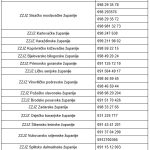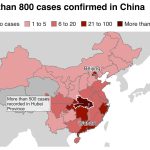May 14, 2020 — The coronavirus doesn’t cause death and disease wherever it goes. For some creatures, it’s been a savior. Just ask Lika’s sheep, and their worried shepherds.
If you do not know Tomo Matanić’s phone number, just stop by his gate in Mušaluk not far from Gospić and yell: “Hosts!” He will materialize with a quick step and show you the arch in which you will bypass his shepherd dogs. There are five of them, according to Jutarnji List’s Marija Pušića.
The boss claims his dogs are dangerous, but only one of them disinterestedly poked his head out of the shade of an old acacia.
A dozen domestic cats hang around the houses, one, the owner’s pet, is a tricolor, he says. The others are stalk mice, as well as sausages and bacon from the table.
Matanić is a civil servant who lives in an apartment in Gospić, but for almost three decades he has been renting an agricultural farm on which he breeds “Lika pramenka,” an autochthonous sheep breed from the area. He has about a hundred heads.
The dangerous coronavirus can hardly find its way to his farm, but it will still have very significant consequences in the stables. While in the rest of the world the virus sows disease and even death, here it sows life.
Due to the coronavirus, Matanić will increase his breeding herd by about fifty head next year. These are lambs that now have no buyers because there is no tourism to go to the Adriatic; no weddings; no birthdays and baptisms are celebrated with a small roast. He doesn’t know what will happen next.
Matanić has already reconciled that he will leave the female lambs, and he hopes that everything will get better, to get rid of the male ones, because where will he go in the fall with 50 young rams?
It is estimated that tens of thousands of lambs will remain unsold in Lika due to the coronavirus situation.
“The number is constantly around a hundred sheep,” Matanić said. “So far, my market has been Plitvice, where we marketed through our Association of Sheep Breeders Lika. The rest is local for weddings and baptisms. We leave ten percent for the rejuvenation of the herd, but because of the virus, it will be 50 percent, which means that all the female lambs will remain.
“I went to get rid of the males first,” he added. “I managed a little bit, but it’s all pathetic and sad. I listen to winemakers when they complain that they have wine left. The wine will not spoil, but to us when the male lamb grows to large, we have little use for it.”
If he doesn’t sell the rams now for the skewer, he will try to sell them in the fall for meat. Matanić believes he will have top quality meat, even though the animals will be ten months old.
The most important thing, he says, is to survive, and everything else will somehow sort itself out.
Matanić maintains his flock demands a top-quality price. The level of his care for the lambs? He plays the sheep music in the barn while they are feeding. To relax them.
Dr. Tomislav Rukavina, a veterinarian and director of the Veterinary Clinic Gospić says that there is no household in Lika that does not have at least a few sheep.
Technically speaking, “Lika lamb” is a product obtained by this special species of sheep bred in the geographical area of Lika. It’s an EU-protected product, but that doesn’t make it any easier to sell. The glut on the market will be hard to move on.
“Who will eat it all, I don’t know,” Rukavina said. “My advice to breeders is to adapt, to overhaul the herd, to leave as many female lambs as possible, in the fall to get rid of old sheep, and to sell the males.”
Breeders were told to sell to overstock buyers, who offered well under the value they were used to.
The lambs must grow in the Lika-Senj County and part of Zadar, in the Gračac area. As for the lamb’s meat, it ripens much later. The flavor and aroma is hard to describe — unique, the shepherds claim.
“How do you describe the smell of a banana?” Rukavina said.
More importantly — how do you persuade a flooded market to buy more lamb?










